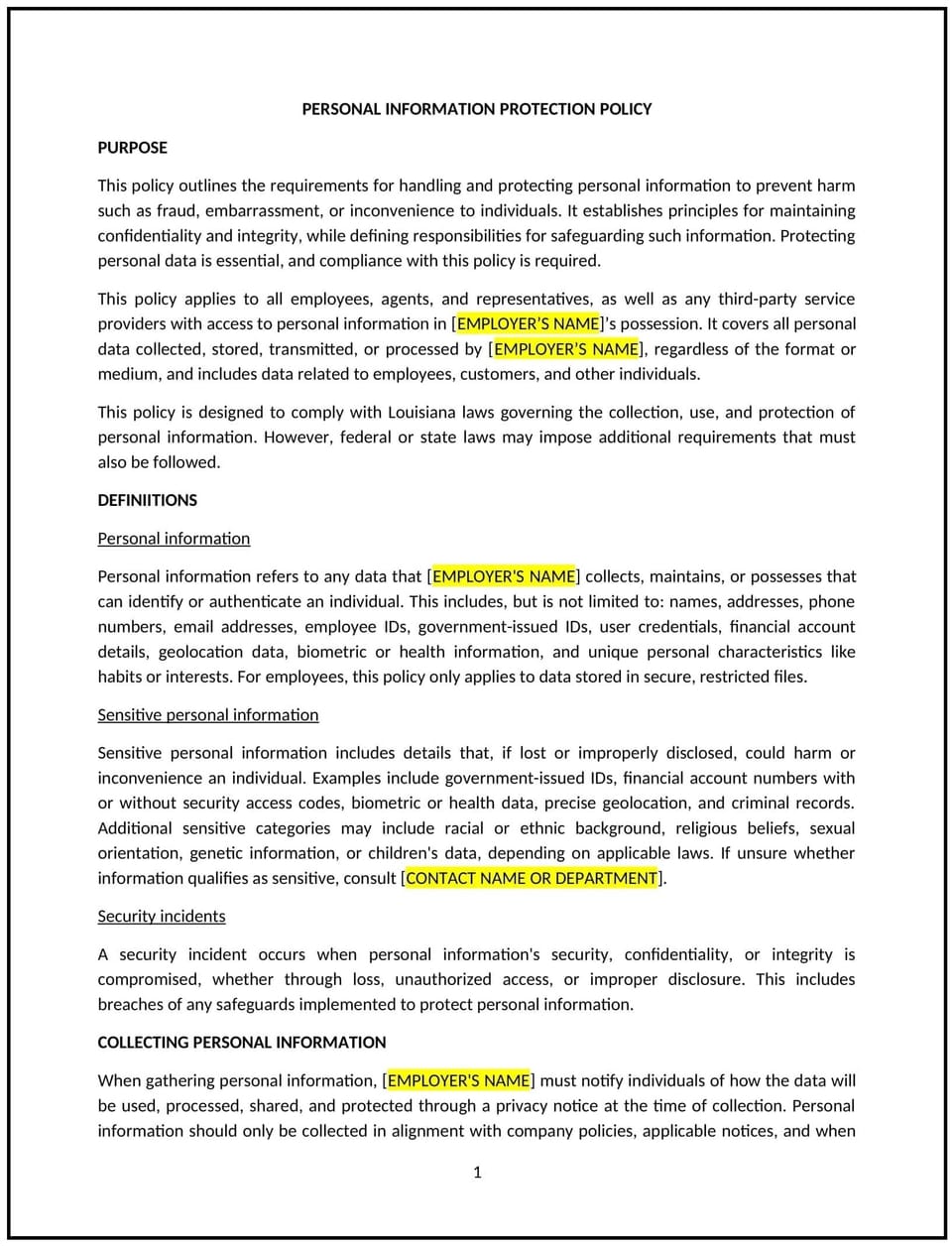Personal information protection policy (Louisiana): Free template

Personal information protection policy (Louisiana)
This personal information protection policy is designed to help Louisiana businesses safeguard sensitive employee, customer, and company data. It outlines procedures for handling, storing, and securing personal information while addressing responsibilities for maintaining privacy and confidentiality.
By implementing this policy, businesses can reduce risks, build trust, and promote a culture of accountability in data protection.
How to use this personal information protection policy (Louisiana)
- Define personal information: Clearly specify what constitutes personal information, such as Social Security numbers, financial data, or health records.
- Establish handling procedures: Provide guidelines for collecting, storing, accessing, and sharing personal information securely.
- Include access controls: Detail who can access personal information and the authorization required for access.
- Address breach response: Specify procedures for identifying, reporting, and mitigating data breaches promptly.
- Provide employee training: Require training on data protection practices to reduce risks and improve compliance.
- Monitor and review: Establish processes for regularly auditing data handling practices and updating security measures.
Benefits of using a personal information protection policy (Louisiana)
Implementing this policy provides several advantages for Louisiana businesses:
- Builds trust: Demonstrates a commitment to protecting employee and customer privacy.
- Reduces risks: Mitigates the potential for data breaches, identity theft, or unauthorized disclosures.
- Promotes accountability: Establishes clear responsibilities for handling personal information.
- Enhances operational efficiency: Streamlines data handling procedures to prevent confusion or errors.
- Reflects Louisiana-specific needs: Adapts to regional data protection considerations and business practices.
Tips for using this personal information protection policy (Louisiana)
- Train employees: Provide regular training on secure data handling practices and the importance of protecting personal information.
- Use encryption tools: Encrypt sensitive data during storage and transmission to reduce risks of unauthorized access.
- Conduct regular audits: Review data handling practices and security measures to identify vulnerabilities.
- Limit data access: Restrict access to personal information to authorized personnel only.
- Update regularly: Revise the policy to address changes in technology, threats, or Louisiana-specific considerations.
Q: What is considered personal information under this policy?
A: Personal information includes data such as Social Security numbers, financial records, health information, and other identifiable details about individuals.
Q: How should personal information be stored securely?
A: Personal information should be stored in encrypted formats, with access restricted to authorized personnel using secure systems.
Q: What should employees do if they suspect a data breach?
A: Employees should immediately report suspected breaches to the designated data protection officer or IT department for investigation and response.
Q: Who is responsible for protecting personal information in the workplace?
A: All employees share responsibility, but specific roles like IT teams or data protection officers oversee implementation and monitoring.
Q: What steps are included in the breach response process?
A: Steps include identifying the breach, containing the issue, notifying affected parties, and implementing measures to prevent recurrence.
Q: How often should this policy be reviewed?
A: The policy should be reviewed annually or whenever changes in data protection practices or Louisiana-specific requirements arise.
Q: What tools can businesses use to enhance data protection?
A: Businesses can use encryption software, access control systems, and secure cloud storage solutions to safeguard personal information.
This article contains general legal information and does not contain legal advice. Cobrief is not a law firm or a substitute for an attorney or law firm. The law is complex and changes often. For legal advice, please ask a lawyer.


